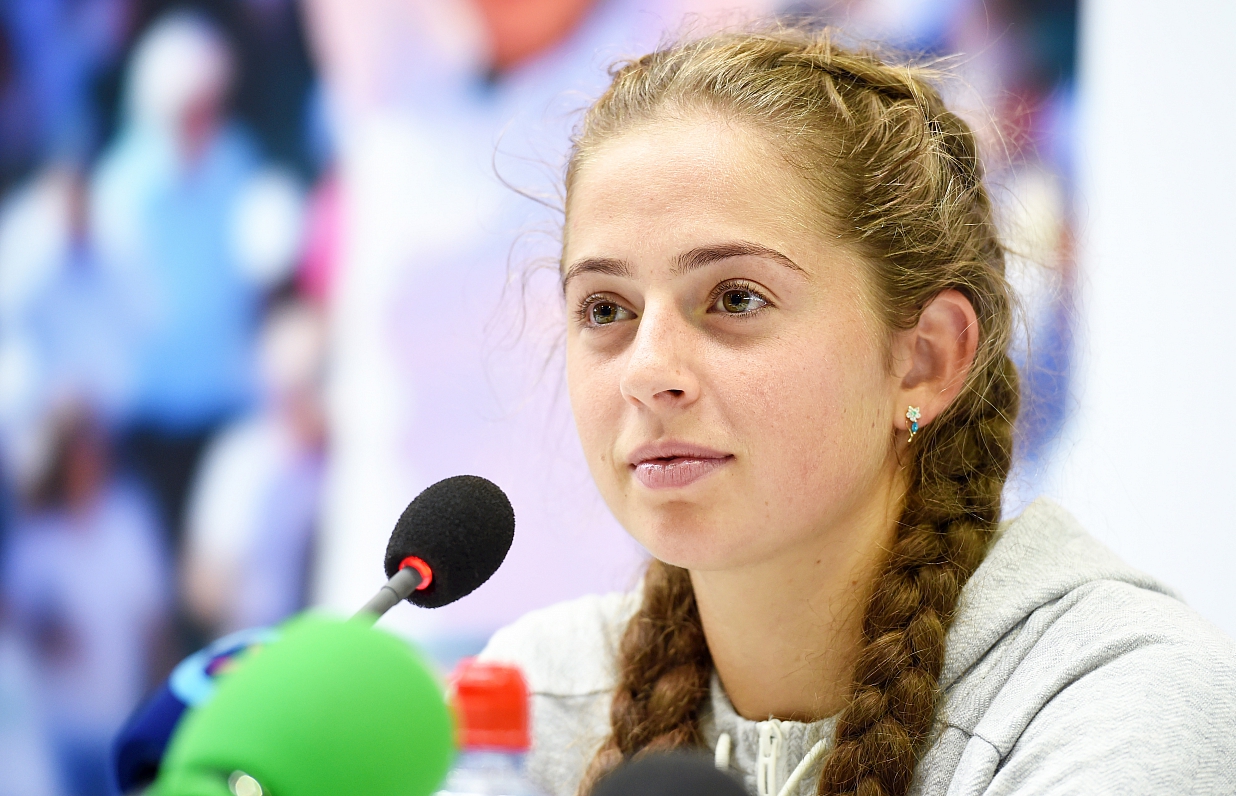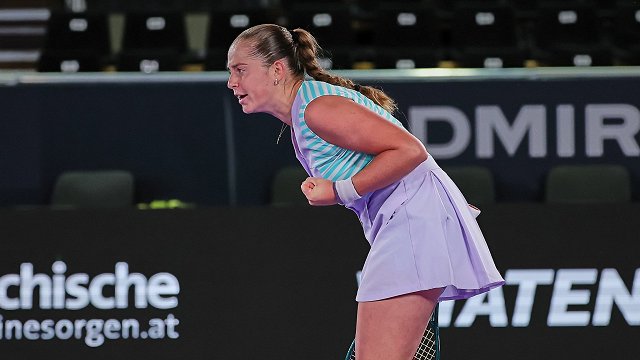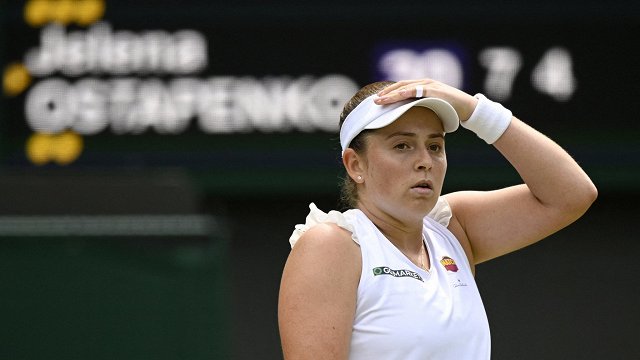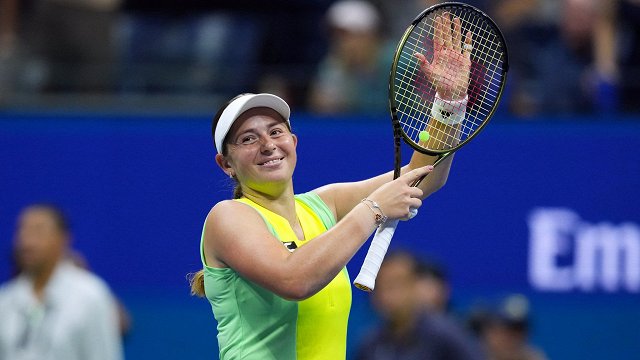What really happened on June 10 on the central court named after Philippe Chatrier is yet to be fully understood. Everyone was shocked about French Open success of Riga-born Jeļena Ostapenko, who also goes by Aļona. How was it possible for the player ranked 47th before the championship, a true underdog if there ever is one, to walk away from the Roland Garros as the winner? Her amazing show of fortitude with seven victories within two weeks--including over the experienced Simona Halep with 4-6, 6-4, 6-3--rewrote not only the history of this tournament but that of Latvian sports as well.
A star named Aļona
A star named Aļona was born in the French capital. Trained exclusively by her mother, Aļona has practiced on the courts of Riga from the age of five. The use of the worn-out word 'star' is warranted in this case. Hers was perhaps not the most important victory for Latvian sports, but it sure was the loudest.
What is Aļona Ostapenko like? I know her quite well for several years. She's not used to compromise. She's hard-working, persistent and without a doubt talented. Her parents deserve a lot of credit too. They raised her to be like this. Fortitudinous and unyielding. Just like her style--aggressive, somewhat shameless, and always dominating. She's a physically strong, tenacious and patient young woman and she's also very smart. She graduated high school with marks just a bit short of excellent. She studied at the Gymnasium of Zolitūde where her favorite subjects were maths and English. She was able find time to do a great variety of things and remained assiduous, pragmatic, and forward-thinking at the same time.
Despite what happened in Paris, Aļona is still the same young woman who takes off to Riga to meet her family and friends whenever she has the chance. She is single at the moment. Well, at least there was no hint of her having a boyfriend when I talked with her and her family. However she has a childhood friend who accompanies her on tournaments–and also braids her hair!
Riga ❤️??? #finally#back#home#love#riga#latviangirl#friends#latvia#2017
Публикация от Jelena Ostapenko (@jelena.ostapenko1997) Май 20 2017 в 5:08 PDT
"Whenever I have time, I fly home to visit my friends and relatives. I love spending my free time with my family and my dog, the Yorkshire terrier Juliet," says Aļona. "By the way, Juliet accompanied me to several tournaments. Thankfully it's easy travelling with her. She weighs short of eight kilos so she could be my carry-on luggage. Usually Juliet spent tournaments in the stands together with my father. By the way, Serena Williams has a dog just like mine, except that she has a boy."
— At one time your dog chewed your tennis racquet. Is it true?
— Not the racquet, but the ball.
Jeļena, it seems, is still not a grown-up. You can see and feel it in her matches. Consider her carefully. Observe her gestures–she's direct and without a hint of pretend.
"She's still a child," says her father Jevgēnijs Ostapenko. "Our girl is ambitious and smart. She studied well and she speaks several languages. But she's still a child... See, she wants to go clubbing with her friends, and asks us, 'Dad, isn't it dangerous?' 'Yes, it is,' I tell her. She still listens to her parents and doesn't seek for thrills just for the sake of it."
Публикация от Jelena Ostapenko (@jelena.ostapenko1997) Ноя 18 2016 в 1:36 PST
Dancing, studying, foreign languages and good food
— Tennis must occupy the greatest role in your life. What are the other things you're interested in?
— I was formerly doing ballroom dance but now I'm doing it as a hobby when I happen to be in Riga. Until a certain age I was faced with an important choice between dancing and tennis. I chose the latter however. It was at the age of 12, it seems, when I realized once and for all that I want to play tennis on a professional level. And I always wanted to become the best tennis player in the world. However I haven't really quit dancing because it gives the right load on your legs and helps with coordination. What else? I study different languages. Food? Of course I eat conscientiously. I'll put it this way–I approach this matter with a sense of responsibly.
— I haven't seen you dance but you seem to be doing well in foreign languages.
— English was my favorite subject at school. So no surprise there. Now I'm studying Spanish and French. Those will come in handy.
— Your teachers said you were close to an excellent student.
— At one time I was studying at an exact sciences class. Learning came naturally to me. I liked studying. I always did my homework. But the teachers–I have to give them their due–were always very forthcoming.
In grade nine I wasn't exempt from the exams so I took them together with everyone else. But in grade ten I was excused from class and I went to school only for after-hours or exams. Grade twelve was complicated as there were numerous tournaments plus the Olympics in Brazil. So we had to turn to the higher-ups and I was excused from the exams via an order by the Education Minister. However I still graduated from the Zolitūde Gymnasium with good grades.
How did I manage? I'm a frequent flyer and I spend a lot of time on the road. I found time to study during tournaments. It wasn't that bad–I took my textbooks along and always found time to study. I used distance learning and took many exams online.
— Do you like reading?
— I read everything that was required at literature class. The book list was imposing but I managed. I read on the plane and in between practice. Now I don't have much time to read.
Публикация от Jelena Ostapenko (@jelena.ostapenko1997) Дек 26 2016 в 5:55 PST
— Your class teacher somehow picked up on you saying that you'll become a famous sportswoman.
— Everyone wants to be famous. I am an uncompromising person by nature so I work a lot to become better and to win.
— You had teachers at school and other teachers in sports. Who are they?
— My main teacher and life coach is my mother. My father was also very busy with me. He was a sportsman as well, he played football. The famous track and field coach Ludmila Olijare has been responsible for my physical form for several years now. Now the team has an agent as well, the Italian Ugo Colombini, who also works with world No. 1 Andy Murray. Previously he was the manager of Argentina's Juan Martín del Potro.
— Many people are interested in your clothing. Do you choose the dresses you wear on the court?
— No, the sponsors do. Previously it was Nike and now it's Adidas. I cannot pick the color too. There's also the dress for the day session and the evening session. Sometimes it depends on the collection. We had the same collection with Simona Halep so we were clad identically for the final game.
What's in the bag?
— Why do tennis players go to the court with such huge bags?
— Because you have to put many things inside. They hold six racquets, two pairs of shoes, different clothing, a warm-up ball, other accessories and bananas. Cosmetics as well...
— Some three years ago you won the Wimbledon junior championships and you've been playing with adults since. This is considered to be a rather difficult transition. How did it go for you?
— It was great. At any rate, I went from junior to adult tennis without any problems. Then again, looking back I remember many curious moments. For example, during my first visit to the Australian Open championship I had my photo taken with all the stars, one after another. You see, I saw them for the first time and it was very interesting to me. Now everything is different–I have seen them and seen them a lot. Now I have to play, instead of having my photo taken.
— Your first and only coach is your mother Jelena Jakovleva. Hasn't it pressed on you having your mother around all the time, both at home and during the tournaments?
— My mother knows me best. She knows both my advantages and my deficiencies. We get along very well. I feel very comfortable with her. It's another thing that sometimes we need someone from the side, for the sake of improving results. But my mother always has the last word. But really, having my mother to coach me is a huge benefit to me.
Happy B-day to the best mum in the world ??? I love you so much ❤️❤️❤️
Публикация от Jelena Ostapenko (@jelena.ostapenko1997) Фев 20 2017 в 11:22 PST
— Many say you're very hard-working. But you do want to laze away sometimes, don't you?
— Of course I do. I'm a normal human being, after all. But now I can't afford it. Sometimes it happens that I don't want to go practice and I want to keep on sleeping. But still I get up and go.
The prized Grand Slam: the eight attempt
As concerns determination... This year's Roland Garros was just the eight Grand Slam Jeļena had participated in. It was the shortest route a player has taken to the Grand Slam after Maria Sharapova scored a victory in Wimbledon. Ostapenko is one of the eleven active women tennis players to have won a Grand Slam.
No one would hesitate to call it a success. She also brought home about €500,000 and according to her mother an equivalent sum has been invested into Jeļena's career. Her career-long earnings are a little bit above €3m. This recognition she earned with her victory in June when she overcame serious opponents like Olympic champion Monica Puig as well as two-time Grand Slam finalist Caroline Wozniacki. And with this came advertisement contracts.
Right after she came back home not just journalists but sponsors too were vying for her attention. She was invited to the Latvian Mercedes representative and the state gave her an extra €28,000 for her victory at Roland Garros.
An interview with Becker and Wiland
— You won't believe how tired I am from all this attention, — says Aļona who has to hide from prying eyes even during breakfast at her home club Enri. —I had more interviews in Paris than I had had my whole life.
After I won there was a marathon of sorts consisting of meetings with journalists and TV people. I spent nine hours a day talking with them. It was very tiresome.
— For sure, Boris Becker and Mats Wiland got on your nerves with their endless questioning?
— I visited Eurosport, too, where they are working as experts. No way around it — it's part of my duties.
— Then you came back to Riga and it started a new. Wasn't it annoying?
— I'm not used to this much attention, to be honest. Of course it's all very pleasant but I want to rest too!
Публикация от Jelena Ostapenko (@jelena.ostapenko1997) Май 24 2017 в 10:59 PDT
— It seemed to me at the special press conference that you were somewhat irritated by the abundance of questions by Latvian journalists. Is that true?
— I'm telling you, I was tired from the copious attention given to me. To be honest, I still can't believe I won. Because it was my dream and now it has become true. I think I start realizing things long after they've happened.
I've had plenty of rest so I'll be alright
— After Paris you were scheduled to go to Birmingham, UK but you decided to skip the tournament. Was there too little time to regain strength?
— My doctor talked me out of it. I had a spine injury. Now I feel better. After Paris I wanted to rest a few extra days but Birmingham was just a week away. Now I think I've rested plenty. I'll be alright.
— You were alright at the Roland Garros finals too. You did not look nervous at all.
— I only started worrying when I started losing the second set. I remember thinking at that time, "I have nothing to lose so I'll prove everything I'm capable of." I knew I'm already in the final and I'm playing such a great player as Simona. And I was losing 6-4, 3-0, and then in my mind I was just, I'm just going to enjoy the match, and I will try to fight until the last point.
— I watched the last set of the final game several times. Did you?
— I don't remember. Maybe I did, a few times. But all of that's in the past. Wimbledon is ahead of me right now.
— Do you prefer clay or grass courts?
— Grass courts. It's the cover that's better to me. It's faster, I suppose. But I was not disappointed with Paris as it has these fast clay courts.
The black Louis Vuitton dress
— Here's a question. Maria Sharapova or Serena Williams?
— For me it's Serena Williams.
— Many are interested in the prize money as it's quite large at more than €2m. It's not a huge sum in tennis but you earned it over the course of two weeks.
— I wasn't counting it. It's not that important to me.
I don't play for money.
I like tennis. I love what I'm doing. I like living at such a pace. If there are victories, money will follow. Two million... better ask my mother.
(her mother and coach explained what concerns taxes: "The French are taking 15% this year. Afterwards you have to declare the amount. The next year it will be different, perhaps they'll take as much as 43%.").
What will I buy with this money? I don't know. I'm not an enthusiastic shopper.
— You shouldn't have any problems with clothing. They gave you an expensive dress after you won in Paris...
— Louis Vitton are the sponsors of Roland Garros. They gave me a stylish black dress for a photo shoot, and a pair of shoes and a bag as well.
— Money and tennis go hand in hand as it's an expensive sport.
— It is expensive and it's no secret. It's true about the half million (the sum that was invested in Aļona's training-ed.). You have to invest about that amount, maybe even more, in order to achieve something. You need hefty investment for flights and accommodation. For coaches and sparring partners, to rent halls and courts, for medicine, for the equipment and the accessories. If you have a child making their first steps in tennis you might do with €100 a month, but afterwards... If you play tennis on a professional level it's €100-€150 for a single practice session.
— When can you start earning money with tennis?
— When you become a top 50 player. It's only then you start earning money, both from sponsors and from prize money.
"Of course the [Sports] Federation helped us in any way they could. We had to find money ourselves, on the internet. We took up extra jobs. When Aļona decided she'll be playing tennis seriously we spent about 10 to 15 thousand euros a month on her. It's a lot of money. It's great that at one time two businessmen gave us some good money. Just because they liked Aļona and the way she plays. If it weren't for them, I don't know..." says her father Jevgēņijs Ostapenko.
All the backhands and forehands...
— On June 8, the day of the semi finals against Timea Bacsinszky you turned twenty.
— You know, I did not expect I'd be celebrating my birthday in Paris. But I'm glad it turned out that way. That evening was very nice—we wandered around Paris with our friends, there was the restaurant and the cake. And I won't forget the evening after the victory. I could return to my folks only at nine in the evening after all the interviews and the doping tests. They had all waited for me—the fans and the head of the Latvian Tennis Association Juris Savickis and his wife. They came to the finals too. Organizers gave us a special place on the second floor. Then we went to the restaurant.
— Do you have time to see anything during tournaments? To walk around the city?
— I have some time. I remember when I first played in New York I went to see the musical Chicago at Broadway.
— Aļona, I'm an admirer of your playing style. It seems all but 'manly'. I think your style is the one that makes people love tennis. How do you manage all these backhand and forehand shots? The stats say that in Paris you made 299 outright winners, which was more than anyone else, even among men. How are you able to do that?
— I have an extreme personality and perhaps that's why I play aggressive tennis.
For example, I love crazy amusement rides and things like that. In Oakland I wanted to jump off a tower but my mother said no as it seemed too dangerous to her. I think I'm very powerful and I was born with this strength. Of course I work out at the gym but I think I was born like this exactly.
I could never sit quietly. I simply couldn't stay in the corner playing with building toys.
I was running somewhere all the time, looking for something new. I'm just like that even now. Nothing's changed.
— They let you into the pilots' cabin when you were flying home.
— Yeah, they had never offered me anything like that. It was great.
— Do you drive a car?
— I do drive a car. I got my licence long ago, in 2015. It comes naturally to me.
Публикация от Jelena Ostapenko (@jelena.ostapenko1997) Апр 25 2017 в 1:39 PDT
Serena Williams? I'll wait for her...
— It would be interesting to compare your game with that of Serena Williams, who is considered the embodiment of playing dominantly. Would you like to compete against her on the court?
— She has always been an idol of mine and I've always liked how she plays. I am able to play an aggressive style of tennis and I like it. I dream of playing against her. But not now. She's expecting a child. But perhaps when she returns.
— I liked Simona Halep's comments after the game. She said that she has given you your dues, that you hit the ball very hard, claiming there were moments when she felt like a spectator on the court and that you deserved the victory. How do you feel about that?
— I had not played against Halep before that. What about her words?
I must admit that I had had breakdowns at some point. But there's nothing of the sort right now. I don't throw away racquets anymore, I am confident on the court and I'm less nervous.
— Is it the work of therapists?
— No, not therapists. It was my mother and my new coach. I've become more mature too. I felt good before my final game in Paris. I won on Thursday and felt calm on Friday, I wasn't nervous. I warmed up on the day of the game and all in all the situation was okay.
— By the way, if it's not a secret, what music are you listening to before you play?
— I listen to all sorts of music, mostly pop. European music that everyone is listening to now and sometimes Russian music.
On the same wavelength with my Spanish coach
— I want to ask you about your new coach, Anabel Medina Garrigues from Spain. It seems you're two are collaborating with success.
— We had worked with her before this too but we hadn't had much success. I was still lacking concentration. Now it's different. It's great working with her as she's very experienced and she knows many players. We top off some things and work on the rest. I think we're doing everything well.
— You and your mom hired her only at the start of the clay season?
— She'll skip the grass season but we'll invite her again during the 'hard' season in the fall.
— Anabel Medina Garrigues commented your victory thus: "I knew she can hit hard, but I'm surprised at how she dealt with the tournament, with the pressure and with the situation in each game. She lost the first set in many games but kept on working and strove towards victory. Going into the quarterfinals she was content but not happy. She wanted more." What will you say?
— It's actually true. I wasn't dead set on victory. I just gradually went towards my goal. The first game was one of the most difficult, and it became easier afterwards. At that, you don't play each day on such tournaments. There's the mandatory day of rest.
— Can you recall your first steps in big tennis?
— My mother had no idée fixe that I absolutely had to play tennis. I liked tennis myself. Right off the bat. You know, it all happened in a kind of a natural way.
My mom often brought me along to work. There I talked with other girls and dragged racquets and balls over the court. They were, so to speak, babysitting me. And gradually I started playing...
I won my first tournament at the age of six. At the age of eight, I became the vice-champion of Latvia playing against 10-year-olds. At the age of eleven I got the world No. 1 title winning 256 of my peers. I will never forget my first important victory—it was also in France—at the Les Petits tournament. It's a world championship for 14-year-olds. Martina Hingis and Rafael Nadal had both won it at some point.
— What's ahead of me? A Career Grand Slam and consequently the title of world No. 1, — Aļona says.
I don't know if I'll succeed but I'll do my best.
— In women's tennis, so they say, the relationships between players aren't simple. You don't have real friends there, so they say. Is that true for you? Your father said that once you accidentally overheard two tennis players talking and decided that there's no point in trying to make friends.
— I'll put it this way. It's likely there actually are no open relationships between them. But I'm friends with many of them and we spend time together. Timea Bacsinszky, whom I beat in the semifinals, is one of them.
— I remember in 2014 you won the juniors' Wimbledon tournament.
— Why shouldn't I shine in London once again? Wimbledon has been my favorite tournament since I was a child. I have long dreamed of it. It has a unique atmosphere, it's a tournament with its own history and traditions.
But you know, I'm not forgetting about the Olympics too. I played in Rio de Janeiro too. Truth be told, I wasn't very lucky as I lost to Samantha Stosur in the very first stage. The Olympics take place once every four years but Grand Slams are held each year. There's a difference.
Aļona is currently playing at Wimbledon where she has already secured a topsy-turvy victory over Belarus' Alexandra Sasnovich in three sets (6-0, 1-6, 6-3). Meanwhile number 18 seed Anastasija Sevastova, from Latvia's third-largest city Liepaja, beat Yulia Putintseva of Kazakhstan in straight sets (6-1, 7-6).



































